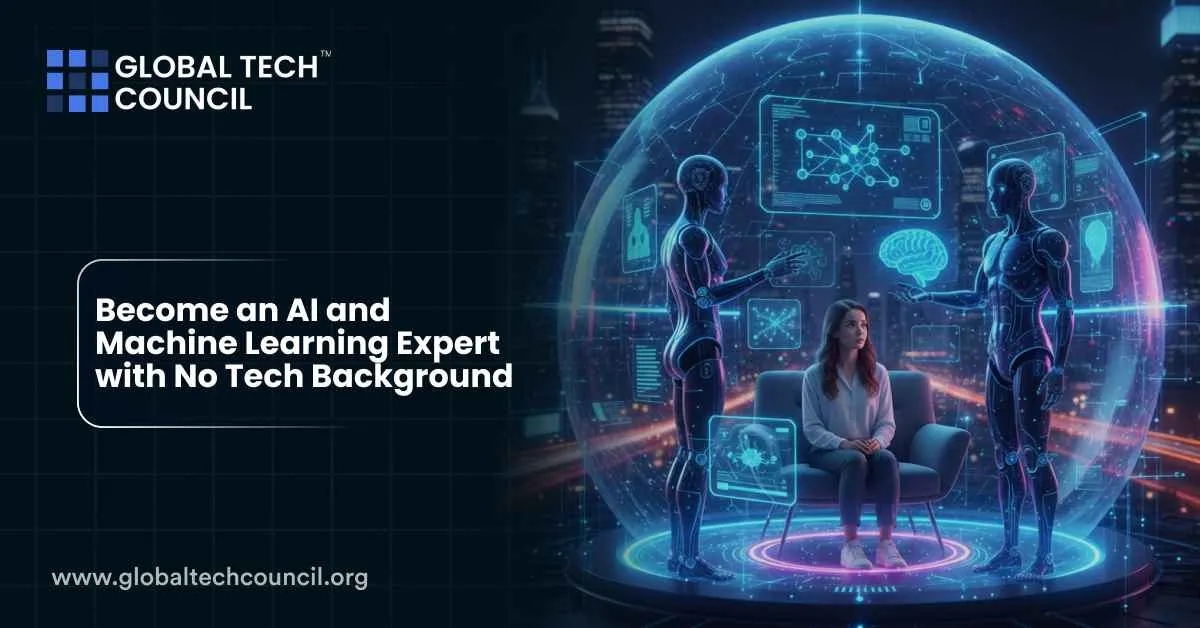
AI Is No Longer Just for Coders
Artificial Intelligence is no longer restricted to programmers and Data Scientists. Companies now value people who understand AI concepts, can work with AI-powered tools, and can translate business needs into AI solutions. If you come from marketing, finance, healthcare, education, or any other field, your domain knowledge is an asset. Pairing it with AI skills can create unique career opportunities.
Enrolling in a Deep tech certification from the Blockchain Council can give you structured, industry-recognized training that is accessible to learners of all backgrounds.
How to Begin Without a Technical Background
Start with AI Awareness
Begin by learning the fundamentals. Understand what AI can do, where it is used, and its limitations. This helps you identify relevant opportunities in your own industry.
Use No-Code and Low-Code Tools
Platforms like Lobe.ai, Teachable Machine, and DataRobot allow you to build AI models without writing code. These tools use simple visual interfaces, which makes it easier to learn by doing.
Focus on Problem Solving
You do not need to be a programmer to work with AI. Roles like AI product manager, AI content strategist, or AI policy analyst require strong analytical and communication skills rather than coding.
Why Certification Matters
Gaining skills is important, but proving them to employers is even more critical. If you are comparing AI certificate programs, look for hands-on labs, mentor access, real datasets, and an exam that validates practical ability.
The Certified AI and Machine Learning Expert program by Global Tech Council is designed for learners of all backgrounds. It covers fundamental concepts, advanced techniques, and hands-on projects that prepare you for real-world application. The program is self-paced, online, and offers lifetime certification upon passing the final assessment.
What You Learn in the Program
This certification spans a structured path from AI basics to applied topics like ethics, generative AI, prompt engineering, model evaluation, and domain use cases. Blend the credential with a focused machine learning course to practice pipelines, feature engineering, and model monitoring using real data.
Career Paths for Non-Technical AI Experts
| Role | Skills Needed | Where You Can Work |
| AI Product Manager | Project management, AI concepts, stakeholder communication | Tech firms, startups, enterprise innovation teams |
| AI Policy Analyst | Regulation knowledge, AI ethics, research and writing | Government, NGOs, consulting |
| AI Content Strategist | Content creation, prompt design, AI tools | Marketing agencies, media companies |
| AI UX/UI Designer | User research, design thinking, AI product integration | Product teams, design firms |
Add Analytical Strength to Your Profile
Once you are comfortable with AI basics, expanding into data analysis can be a smart move. This combination makes you valuable for roles that require interpreting AI outputs and providing actionable insights. Earning a Data Science Certification from Global Tech Council can give you the skills to work with visualization, predictive modeling, and advanced analytics.
Industries Ready for AI Talent Without a Coding Background
| Industry | AI Applications | Non-Technical Roles |
| Healthcare | AI-powered diagnostics, workflow automation | AI compliance officer, AI adoption trainer |
| Education | AI tutoring systems, personalized learning | AI curriculum designer, learning strategist |
| Finance | Fraud detection, process automation | AI project coordinator, business analyst |
| Retail | Personalized recommendations, inventory optimization | AI marketing manager, AI operations planner |
Advancing Into Leadership Roles
As AI becomes central to business strategy, leadership positions are opening for professionals who can oversee AI adoption across teams. This includes roles like AI program director, head of AI innovation, or even Chief AI Officer. Strengthen your management and strategy toolkit with a Marketing and Business Certification from Universal Business Council to prepare for cross-functional leadership.
Final Takeaway
You do not need to write a single line of code to start a meaningful career in AI. By combining your existing skills with AI literacy, no-code tools, and recognized credentials, you can move into roles that match your strengths. An AI and machine learning certificate can signal readiness to employers and help you step into one of the most exciting career paths of the future.